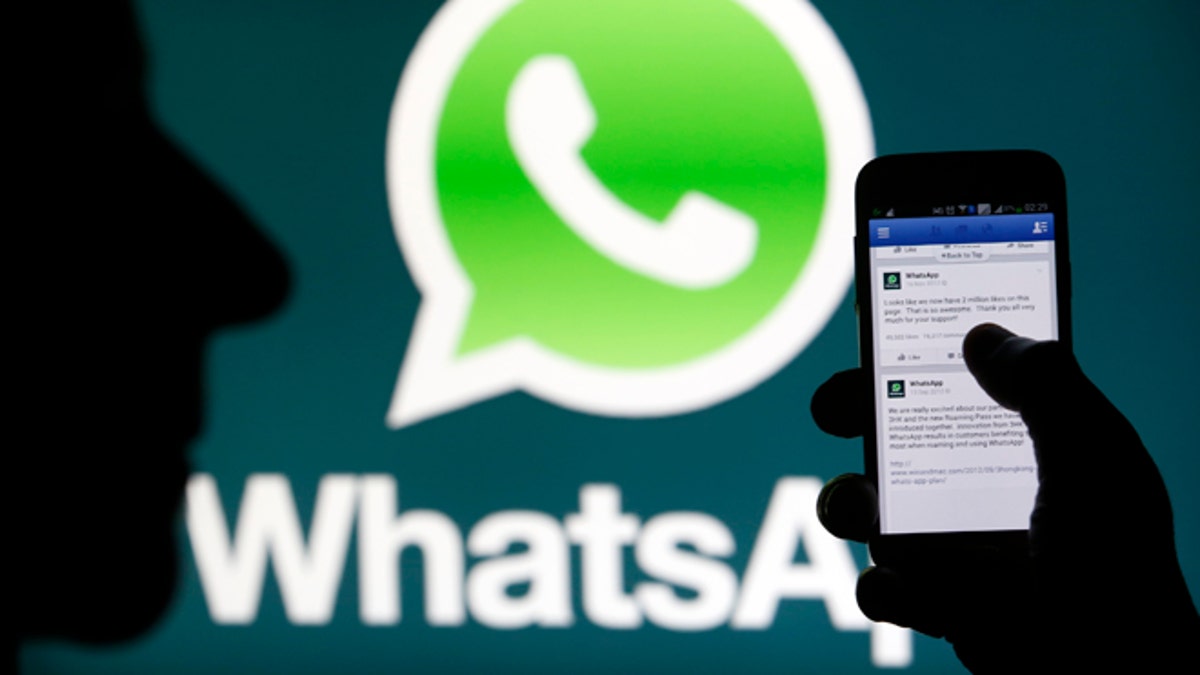
A Whatsapp App logo is seen behind a Samsung Galaxy S4 phone that is logged on to Facebook. Facebook Inc will buy fast-growing mobile-messaging startup WhatsApp for $19 billion in cash and stock in a landmark deal that places the world's largest social network closer to the heart of mobile communications and may bring younger users into the fold. (Reuters)
RIO DE JANEIRO – Communicating became more complicated for some 100 million Brazilians on Thursday when a state judge order the popular messaging service WhatsApp blocked for 48 hours.
The reason for the order was murky because it arose from criminal proceedings in Sao Paulo state that are kept under judicial secret.
However, Mark Zuckerberg, who heads WhatsApp's parent company Facebook, said in a Facebook post that the case was related to the company's attempt to guard customers' data.
"I am stunned that our efforts to protect people's data would result in such an extreme decision by a single judge to punish every person in Brazil who uses WhatsApp," Zuckerberg wrote in his Facebook post.
"Until today, Brazil has been an ally in creating an open Internet," he added. "Brazilians have always been among the most passionate in sharing their voice online."
Brazil's biggest telecoms put up scant fight against the judicial order. For months they have complained about WhatsApp, saying that they lose revenue because clients use its free services instead of using the phone companies' own text messaging. But the association representing the cellphone industry, SindiTelebrazil, denied in a statement those companies were the plaintiffs in the case.
Brazilians are among the globe's most voracious users of social media such as Facebook, WhatsApp and Twitter.
Many were quickly migrating to WhatsApp's competitors. Viber said usage in the Brazilian market had grown by 2,000 percent in 12 hours, while the messaging service Telegram said over 1.5 million new Brazilian clients started using it Thursday.
Technology companies often run into roadblocks in Brazil's complicated legal system, where single judges have in the past tried to block Facebook, Google and other services for various reasons, such as failure to remove offensive posts or not handing over user information for investigations.
However, Thursday's block of WhatsApp appeared to be the first time a major online service was blocked nationwide.
"This is insane. It's ruining my 'secret Santa' party!'" said Caroline Largueza, as she furiously tapped away on her smartphone in a Rio de Janeiro mall.
The university student planned to meet friends to exchange Christmas presents on her school's campus, but they'd intended to consult over WhatsApp on Thursday exactly where they'd gather.
"Without WhatsApp it's extremely hard to communicate with anybody," she complained.
WhatsApp is used by nearly half of Brazil's population, according to the company.
Media outlets use it to obtain tips, photos and video from readers; families have chat groups to share snapshots of kids and organize family dinners; taxi drivers are constantly trading advice via WhatsApp on where traffic is bad and where clients are waiting.
"Today I fell ill and I am working from home. I have two WhatsApp groups with my staff," said Luciana Rego, a manager at a household care products company. "When I am out, I give all the instructions in the app, they tell me what they are doing. It's great to speed up decisions, we use it a lot. Today it is taking a long time. We went back to email."
In a statement, Sao Paulo's state court system said only that California-based WhatsApp had ignored two prior judicial orders this year.
"Because even then the company did not heed the judicial decision, the public prosecutors' office requested the service be blocked," the court's statement read.
While WhatsApp users in Brazil are still able to open the app, their messages are not being sent.
___
Associated Press writers Mauricio Savarese in Sao Paulo and Brad Brooks in Rio contributed to this report.
___
Follow Jenny Barchfield: www.twitter.com/jennybarchfield
